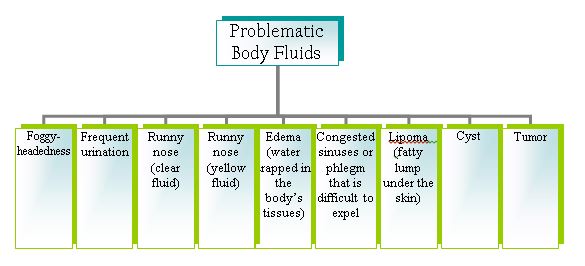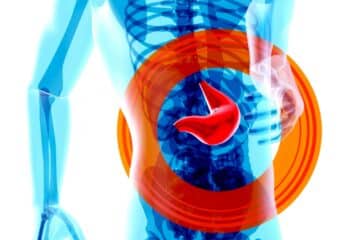The idea of fluid metabolism is a key one in the understanding of many health issues in Chinese Medicine. A person with healthy organ systems takes in fluids through food and drink, which are purified and dispersed to all the body in order to moisten, nourish and lubricate the tissues.
When one or more of the organ systems become imbalanced the movement of fluids around the body can be affected, leading to improper distribution and the body’s inability to use those fluids effectively. Depending on how out of balance the body is, symptoms can show up along a scale of severity from a fairly mild foggy feeling to more severe issues, like tumors and growths. This is illustrated in the chart below:

Several organ systems can play a role in this occurring. The main ones are:
Spleen/Pancreas – which take fluids from the food/drink we ingest, do some purification and distribute them in proper amounts to the other organs and tissue.
Lungs – which take the purified fluids from Spleen and distribute them under the skin to lubricate the exterior of the body.
Kidneys – take purified fluids from Spleen, sending them out to moisten organs and further filter them sending the impure to the Bladder to be removed.
Most health complaints concerning fluids fall under three main types, excessive fluids, stuck fluids or deficient fluids.
Excessive Fluids (Dampness)
As the name implies this is a buildup of too much liquid in the body in places where it is not supposed to collect. Common ailments in this group include puffiness, edema, heavy feelings, lethargy, chronic cough, running nose (sinus irritation) with clear thin mucus, diarrhea, cloudy urine or discharges.
Stuck Fluids (Phlegm)
The Chinese described several forms of phlegm, as it is a major culprit in many disease processes in this medicine. There’s the obvious phlegm of a chronic sinus issue or bronchitis. It’s usually sticky and difficult to get rid of. Then, there is the idea of more “hidden” phlegm that collects internally. This can describe lipomas, cysts, tumors, arterial plaque and excess cholesterol, even the calcifications that build up on joints in arthritic conditions. Some mental/emotional issues can have a phlegm component to them as well, usually with foggy or confused thinking or mental dullness.
Deficient Fluids (Dryness)
Somewhat different than the other two, but no less a problem is the issue of not enough fluids. This can result from simply not drinking enough water, but sometimes we see patients who’s fluid intake is pretty good, yet they have complaints of a nature of dryness. Some of the main complaints of this type are dry skin, eyes, mouth, sinuses, constipation, muscle and tendon tightness and inflexibility, heat sensations and hot flashes and loss of range of movement in one or several joints (not related to injury).
Each of these can have a lot to do with our eating and drinking habits, and often can be positively affected by changes in diet and lifestyle. Usually by the time symptoms have become really bothersome, additional intervention, such as Acupuncture and Herbs are required to handle the problem. At AHHA we work to employ a comprehensive course of care using both Acupuncture and often times herbal formulations for these patients. Each patient is evaluated to determine which organ(s) are not working optimally and a plan is put into place to restore those systems and re-balance them with the rest of the body. We also work with our patients to find and correct any dietary or lifestyle habits that can perpetuate or worsen their fluid metabolism problems to help them take restore their body to good health and keep it that way in the long term.


